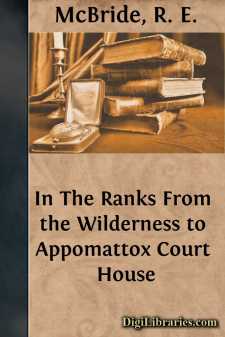Categories
- Antiques & Collectibles 13
- Architecture 36
- Art 48
- Bibles 22
- Biography & Autobiography 813
- Body, Mind & Spirit 142
- Business & Economics 28
- Children's Books 17
- Children's Fiction 14
- Computers 4
- Cooking 94
- Crafts & Hobbies 4
- Drama 346
- Education 46
- Family & Relationships 57
- Fiction 11829
- Games 19
- Gardening 17
- Health & Fitness 34
- History 1377
- House & Home 1
- Humor 147
- Juvenile Fiction 1873
- Juvenile Nonfiction 202
- Language Arts & Disciplines 88
- Law 16
- Literary Collections 686
- Literary Criticism 179
- Mathematics 13
- Medical 41
- Music 40
- Nature 179
- Non-Classifiable 1768
- Performing Arts 7
- Periodicals 1453
- Philosophy 64
- Photography 2
- Poetry 896
- Political Science 203
- Psychology 42
- Reference 154
- Religion 513
- Science 126
- Self-Help 84
- Social Science 81
- Sports & Recreation 34
- Study Aids 3
- Technology & Engineering 59
- Transportation 23
- Travel 463
- True Crime 29
In The Ranks From the Wilderness to Appomattox Court House
by: R. E. McBride
Description:
Excerpt
PREFACE.
In giving this book to the public we do so under the same plea which justifies those pleasant gatherings called "reunions," where men of the same regiment, corps, or army, meet to extend friendly greetings to each other, to friends, and all comrades in arms.
The writer has found it a pleasant task to recall the scenes of fifteen years ago, when, a mere boy in years, he had a part in the events here recorded. He is conscious of a kindly affection toward the men who were his companions during those stirring times. Kindness, thoughtfulness, forbearance, toward the boy-soldier, are not forgotten. If he found any thing different from these in his intercourse with men or officers, it has passed from memory, and he would not recall it if he could.
We trust, also, that this work may have a mission of utility to the generation that has grown up since the war.
There is a certain almost indefinable something, which has been summed up under the expression, "military traditions." This comes not alone from formal histories of the wars of the nation, but more largely from the history which each soldier carried home with him after the war was over. It meant something more than a certain amount of small family vanity, when men used to say, "My father was a soldier of the Revolution;" "My father fought at Lundy's Lane."
There lay back of this the stories told to wondering little ones while they gathered around the arm-chair of the soldier grandfather. Here were planted the seeds of military ardor that found expression at Gettysburg, Vicksburg, Atlanta, and the Wilderness. It is thus the past of the nation projects itself into the present. Our comrades that sleep down yonder guard their country more effectually than if, full armed, they kept unceasing watch on all her borders. Though dead, they yet speak,—yes live, in the spirit which yet lives in the hearts of their countrymen. The cause they died for our children will love; the institutions they preserved at such cost, our sons will perpetuate by intelligent devotion to freedom and her laws.
Is it in vain, then, my comrade, that I sit down in your family circle, and tell your children the story of our hardships, trials, reverses, victories?
This narrative is submitted to you almost as first written, when intended only for the perusal of my own family. In recounting events subsequent to August 19, 1864, when the One Hundred and Ninetieth is spoken of, the One Hundred and Ninety-first is also included, as they were practically one.
Since completing the work, the author has learned that the report of the Adjutant-general of Pennsylvania gives these regiments, the One Hundred and Ninetieth and One Hundred and Ninety-first, no credit for service subsequent to the battle of Welden Railroad, in August, 1864. We give an explanation of this in the closing chapter, and send forth this volume, hoping that it may serve, in some measure, to do justice to as devoted a body of men as Pennsylvania sent to the field.
Seneca, Kansas, March, 1881.


